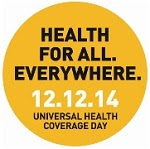

On the occasion of the G20 summit in Brisbane, Australia, IDF launched a campaign calling on G20 governments to implement national diabetes prevention plans and introduce policies to reduce sugar, salt and fat intake. IDF estimates that countries investing in tackling type 2 risk factors could save up to 11% of healthcare expenditure per year. For countries like Australia, this equates to a saving of 862 million AUD.
Each G20 Head of State and Government and Minister of Finance received a bespoke, high-quality call-to-action ‘card’ developed by IDF and containing key messages for their countries, including the economic impact of the diabetes burden. In addition, apress release was sent out to over 3,000 members of the media attending the G20.
|
|
“Tackling diabetes starts with the first meal of the day” was the theme of this year’s WDD breakfast event in Brussels. The event – the first of its kind hosted by IDF EO - focused on the importance of healthy eating and living as a cost effective means of reducing the diabetes burden. The advocacy event was attended by key opinion leaders and hosted by Sir Michael Hirst, President, IDF, and moderated by Dr Petra Wilson, CEO, IDF. Key speakers included Dr. Roberto Bertollini, WHO; Dr. Walter Seidel, DG Development and Cooperation - EuropeAid, European Commission, and Mr. Massimiliano Paolucci, World Bank.
| ||||
Global NCD Framework: Global Coordination Mechanism (GCM) for NCDs
Following WHO adoption of terms of reference for the Global Coordination Mechanism for NCDs (GCM/NCD) at the 67th World Health Assembly in May 2014, WHO and stakeholders have increased efforts to solidify a GCM structure. The International Diabetes Federation (IDF) is a participant in the GCM and provides valuable input into processes which will be key in preventing and managing NCDs globally.
The purpose of the WHO GCM/NCD is to facilitate and enhance coordination of actions against NCDs at all levels of society to lead to the implementation of the WHO Global NCD Action Plan 2013–2020. Its objectives are: advocating and raising awareness of NCDs; disseminating knowledge and information on how to address them; encouraging innovation and identifying barriers; advancing multisectoral action for NCDs; advocating for the mobilization of resources for NCDs. The work plan for the WHO GCM/NCD covering the period 2014-2015 is available in this link.
| ||||
Second International Conference on Nutrition – ICN2
The Second International Conference on Nutrition (ICN2), jointly organised by WHO and FAO, took place in Rome from 19 to 21 November. Representatives from more than 170 governments attended and endorsed the Rome Declaration and the Framework for Action, which commit world leaders to implement national policies to tackle all forms of malnutrition, including overweight and obesity.
The Civil Society Organizations and Social Movements’ Forum, held in Rome November 17 and 18, gathered more than 150 representatives from civil society – including IDF – to discuss the strengths and weaknesses of the Rome Declaration and the way forward. The CSO Forum Declaration can be accessed here.
| ||||
Open letter to WHO and FAO Director-Generals on a Global Convention for healthy diets
On the occasion of the ICN2, over 320 international experts and civil society organisations – including IDF - signed an open letter asking for the development and implementation of a Global Convention to protect and promote healthy diets, using the example of the successful Framework Convention for Tobacco Control. The letter was sent to Dr. Margaret Chan and Dr. Graziano Da Silva and can be accessed here. IDF kindly requests your cooperation in promoting this letter amongst your network.
| ||||
WHO Commission on Ending Childhood Obesity
On 14 October WHO held the first informal hearing with nongovernmental organisations of the Commission on Ending Childhood Obesity, which is charged of producing a report compiling effective interventions in tackling children and adolescence obesity. Several issues were raised during the discussion, including the need to swift from industry self-regulation to the implementation of stronger policies, especially in the marketing area. IDF intervened in this first hearing and will continue to be involved in the work of the Commission throughout 2015.
| ||||
Universal Health Coverage (UHC) Day
On 12 December, IDF will join the first UHC Day to defend the right of all people to access quality healthcare without risking financial hardship.
| ||||
WHO discussion paper on a Framework for country action across sectors for health and health equity
WHO has released a discussion paper on the development of a Framework to promote multi-sectoral action at a country level to improve health and health equity. The document recognises that diabetes and other primary NCDs, their risk factors and social determinants become a priority and outline a series of questions on actions at national level, the role and responsibilities of the public sector and monitoring and progress reporting. Background on this process can be accessed here and the deadline for comments is 31 December.
|





























.png)











No hay comentarios:
Publicar un comentario